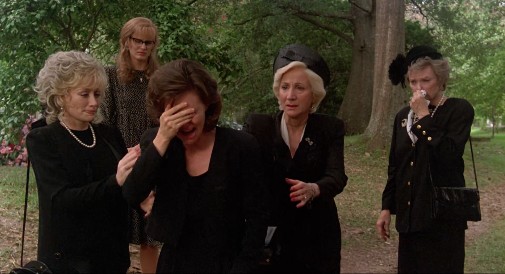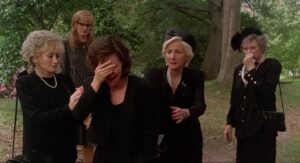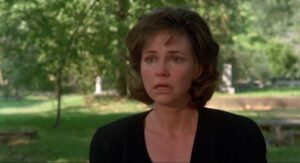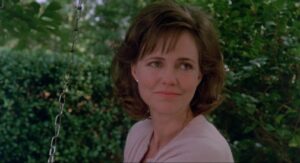
“A tale of strength, resilience, and enduring friendships in Steel Magnolias.”
As it happens, the young woman’s kidneys are caput, so M’Lynn’s donating one of hers in hopes of saving her daughter. She talks about it at the salon, always trying to keep things light, painting over the growing cracks in her façade. Soon enough, there’ll be no reason to keep on hiding the suffering. There’ll be no more strength to do so either. Four months after the transplant, Shelby falls into a coma and, informed her condition is irreversible, the family decides to remove her from life support. Tragedy breaks M’Lynn, eradicates the need to put on a fake smile, and culminates in one amazing funeral breakdown, whereupon she’s persuaded to accept Shelby’s decisions despite their deadly consequences.

If Field performed the mother’s dying hope in the hospital as a desperate, ragged sort of optimistic resilience, afterward she’s a raw nerve with nothing left to give, no more smiling illusions to fuel her resilience. The silence of death is staggering, but the loudness of unresolved grief is a shock to the system. Riding the wave of intensity, Field explodes the characterization and delivers the dialogue with a kind of theatricality so sincere it transcends the baseline artifice of this Southern melodrama. It’s a towering moment, maybe the single best scene in Sally Field’s filmography as far as her work’s concerned.From despondence to pure wrath, from denial to inquisition, from drowning in darkness to laughing in the face of unimaginable pain, the two-time Oscar winner delivers an act of blinding beauty in its sentimental earnestness. So exemplary is the moment, it should be included as reference next to the definition of “catharsis” in the dictionary. If “maternal devotion” is in the book, then add a reference there too. Bless Herbert Ross for allowing Field to take control of the scene, allowing her to present this acting showcase for the ages. Even after life moves on, the grief remains as a shadow that makes the light feel brighter than it would otherwise be.

While she had her Oscar clip ready to go, Sally Field was left out of the Academy’s Best Actress lineup. She still got a Golden Globe nomination, though, and it’s hard to feel bad for an actress who had just recently won her second Oscar. Instead of bestowing Field with a third nod, AMPAS nominated Isabelle Adjani in Camille Claudel, Pauline Collins in Shirley Valentine, Jessica Lange in Music Box, Michelle Pfeiffer in The Fabulous Baker Boys, and Jessica Tandy in Driving Miss Daisy. The latter won for her Best Picture-winning project, and it’s fair to say that, even without Sally Field, this is a solid lineup. The erstwhile flying nun turned Academy favorite would have to wait until 2012 for her third nomination, this time in Best Supporting Actress for work in Lincoln.
Steel Magnolias has been recently added to Netflix’s catalog. You can also find the movie available to rent on most services.Sally Field is fine in Steel magnolias, but nothing special for me, I prefer Shirley MacLaine.

It was a good lineup, maybe Winona Ryder (Heathers) or Kathleen Turner (The war of the Roses) or Meg Ryan (When Harry met Sally) deserved more attention from the Academy.Sally Field is magnificent in the scene at the graveyard. In interviews, Olympia Dukakis openly praised Field relaying that the emotionally wrought scene took three full days to shoot in the summer Louisiana heat. According to Dukakis, Field played the scene each time full throttle, both for the camera and for her fellow actresses when the camera was shooting their reaction shots.
